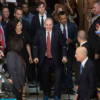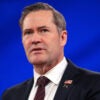Great observation by Michael Barone on Treasury Secretary Timothy Geithner’s latest bank bailout plan:
Democrats like Barack Obama and Barney Frank, at least on the campaign trail or in sound bites, have portrayed the financial crisis as the product of deregulation. The solution, they say, is more regulation.
…
My American Enterprise colleague Peter Wallison has argued powerfully that this is a bad idea. Neither the Federal Reserve or other regulators identified the systemic risk which caused this crisis. Neither did most financial institutions or investors. Systemic risk is hard to identify for the very reason that it is systemic: It results from just about everyone doing what turns out to be the wrong thing.
…
Which takes me back to the Geithner paradox. He has singled out unregulated institutions as the only ones to bail out regulated institutions. Yes, financial markets do need to be regulated, in intelligent ways. We need rules of the road and the ability to prosecute fraud. With hindsight, we can identify bad decisions by regulators which helped produce this financial crisis (the government’s implicit guarantees of Fannie Mae and Freddie Mac, the unduly high leverage allowed to banks and investment banks). But regulation does not automatically produce safety. It may very well, as Wallison argues, increase rather than mitigate systemic risk.Geithner, as I see it, is asking the unregulated players—the hedge funds and private equity firms—to do what Wallison recommended that the government do, buy the troubled assets “at their ‘net realizable value,’ which is based on an assessment of their current cash flows, discounted by their expected credit losses over time.” He’s trusting the unregulated players, rather than the government, to discover what that value is, by subsidizing their investments while limiting their downside risk.
…
This may work as intended. I certainly hope so. But it does give us some things to keep in mind as we ponder how financial markets should be regulated in the future. We don’t want to regulate every player strictly. There is a place for unregulated operators. And tight regulation will never automatically protect us against systemic risk.
The Daily Signal depends on the support of readers like you. Donate now





























